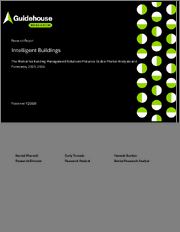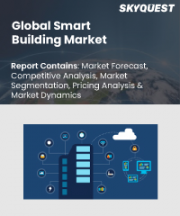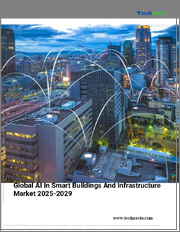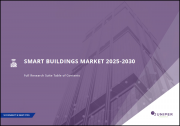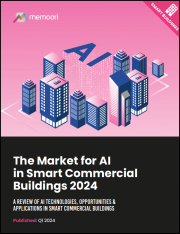
|
시장보고서
상품코드
1448836
스마트 상업 빌딩용 인공지능(AI) 시장(2024년)The Market for AI in Smart Commercial Buildings 2024 |
||||||
본 보고서는 상업 빌딩 시장에서 인공지능(AI)의 역할 확대에 대해 조사하는 2024년 기준의 최신 분석 보고서입니다.
이 최신 분석은 Memoori의 2021년 인공지능(AI) 시장 분석을 바탕으로, AI의 전반적인 역량과 전문적 용도 모두에서 발생하는 변화에 주목하여 보다 스마트하고 지속가능하며 반응성이 높은 건축 환경을 구현할 수 있는 AI의 변화를 분석합니다.
이 보고서는 2편으로 구성된 보고서 시리즈 중 제1편이며, AI 시장 전망에 대한 제2편은 올해 하반기에 발간될 예정입니다. 두 보고서 모두 2024년 Premium Subscription Service에 포함되어 있으며, 대규모 언어 모델(LLM)을 활용하여 모든 분석 보고서를 검색할 수 있는 Chatbot AIM에 액세스 할 수 있습니다.
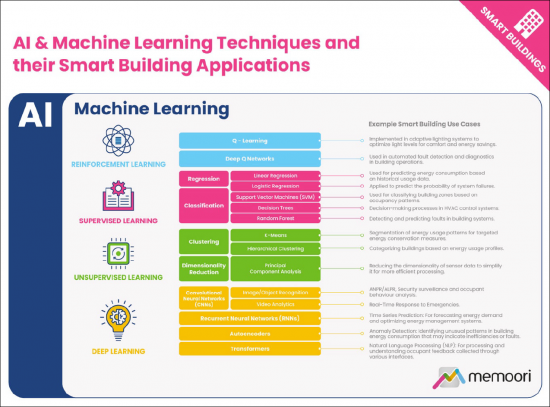
본 보고서에서 답변한 주요 질문
- 우리는 "진정한 인지 빌딩"으로 향하는 단계에 어디쯤 와 있는가? 오늘날의 상업 빌딩 기술은 규칙 기반 분석에서 AI 예측 머신러닝 모델로 전환하고 있지만, 아직 도입은 제한적인 수준에 머물러 있습니다. 실제 도입 범위는 에너지 최적화, 공간 활용, 보안 등 잘 알려진 분야에 국한되어 있습니다.
- AI의 광범위한 보급을 방해하는 요소는 무엇인가? AI의 보급을 가로막고 있는 문제들은 기존 시스템과의 기술 통합, 필요한 전문 기술 및 광범위한 교육 부족, AI 솔루션을 효과적으로 활용하기 위해 필수적인 새로운 프로세스를 받아들이는 데 시간이 걸리는 상업용 부동산 내 문화 등 다양합니다.
- 중기적으로 상업 빌딩용 AI 시장은 어떻게 성장할 것인가? 스마트 빌딩 AI 시장은 2028년까지 25.5%의 CAGR로 성장하여 64억 8,000만 달러에 달할 것으로 예상됩니다.
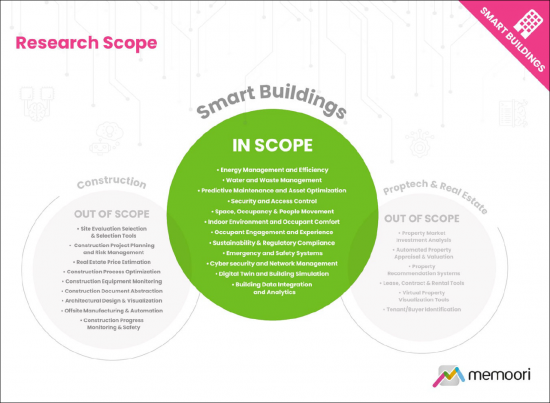
이 보고서는 164페이지의 글과 18개의 도표로 구성되어 있으며, 모든 중요한 사실을 추출하고 결론을 도출하여 AI 기술이 상업 빌딩에 어떻게 적용될 수 있는지, 그리고 그 이유를 정확하게 이해할 수 있도록 도와줍니다.
- Memoori는 광범위한 분석을 통해 66개의 개별 AI 사용 사례를 12개의 주요 도메인으로 분류했습니다. 각 도메인에서는 스마트 빌딩을 위한 솔루션이 활발히 개발 및 상용화되고 있습니다. 지속가능성 및 에너지 효율성 증진, 보안 강화, 거주자 경험 맞춤화 등 다양한 잠재적 이점을 포함하고 있습니다.
- 대형 기술 기업들은 'AI 군비 경쟁'에 수억 달러의 자금을 투자하고 있습니다. 이는 모든 산업에 이익을 가져다주는 빠른 혁신을 촉진하고 있습니다. 예를 들어, ARK Invest의 조사에 따르면, 딥러닝 모델의 학습 비용은 무어의 법칙보다 50배 빠른 속도로 감소하고 있습니다.
- 상업 빌딩 산업은 업무 효율성 향상, 거주 경험 개선, 지속가능성 목표에 대한 기여 등 AI의 잠재력으로 인해 큰 진전을 이루고 있습니다. AI 기술이 더욱 친숙해짐에 따라 상업용 부동산 이해관계자들은 AI의 잠재력을 최대한 활용하기 위해 이러한 발전을 탐색할 필요가 있습니다.
이 보고서는 기업이 전략 수립을 개선하고 AI 기술 도입을 통한 비즈니스 발전 가능성을 검토할 수 있도록 귀중한 정보를 제공합니다.
목차
서문
조사 범위와 방법
주요 요약
제1장 AI와 머신러닝의 기초
- 머신러닝의 기본적인 접근법
- 강화 학습
- 지도 학습
- 비지도 학습
- 심층 학습(딥러닝)
- AI의 전문 영역
- 컴퓨터 비전
- 자연어 처리(NLP)
- 생성형 AI
- 로봇공학
제2장 테크놀러지 실현요인
- IoT(사물인터넷)
- 빅데이터
- AI 하드웨어와 컴퓨팅
- AI 칩
- AI 엣지 디바이스
- 데이터 처리 인프라
제3장 AI 모델 트레이닝과 데이터 요건
- 연수 비용의 지속적인 저하
- AI 트레이닝의 골과 학습 목표
- 데이터 요건
- 스마트 빌딩의 전이 학습
제4장 시장 현황
- 과대 광고인가 현실인가?
- 일반적인 AI의 도입·투자 동향
- 업계별 도입률
- 지역에 의한 차이
- 투자 동향
- 투자 수익률(ROI)
- 기업 감정
- 주요 사용 사례와 활용 영역
- 스마트 빌딩 채용·투자 동향
- 채용 지표
- 조사 지표
- 스마트 빌딩용 AI 솔루션 성숙도 평가
제5장 시장 기회 규모 평가
- AI 시장 예측의 메타 분석
- AI에 의한 이익 평가
- 지역별 시장 분석
- 스마트 빌딩 시장 예측
제6장 활용 영역과 사용 사례
- 스마트 빌딩 사용 사례 : 개요
- 사용 사례의 데이터 입력에 대한 매핑과 AI 방법
- 스마트 빌딩 사용 사례 : 시장 평가
- 에너지 관리와 효율
- 도메인 개요
- 주요 사용 사례
- 수도·하수관리
- 예지보전·자산 최적화
- 보안·액세스 제어
- 공간·공실·인원 이동
- 실내 환경·거주자 쾌적성
- 거주자 참여와 경험
- 지속가능성과 규제 컴플라이언스
- 긴급·안전 시스템
- 사이버 보안·네트워크 관리
- 디지털 트윈·건물 시뮬레이션
- 데이터 통합·분석
제7장 시장 과제와 성장 억제요인
- 노후화 인프라
- 사용자 신뢰와 신용
- AI의 과대 평가와 마케팅
- 해석 가능성
- 정확함과 착각
- 데이터 관련 과제
- 통합, 상호운용성, 오픈 스탠다드
- 데이터 소유권과 관리
- 데이터 품질
- 데이터 프라이버시
- 스킬 격차와 인재 육성
- 배치 전환
- AI의 에너지 소비량
제8장 윤리상·규제상 고려사항
- AI의 안전성·윤리성·정합성
- 현재의 AI 규제와 스마트 빌딩에 대한 영향
- AI 규제·표준 : 세계 각국에서의 차이
- 데이터 프라이버시
- AI 규제 상황이 진화하는 방법
제9장 향후 시나리오와 그 의미
- AGI(범용 인공지능)으로의 길 : 현황에 대해
- 생성형 AI와 인터랙티브 AI의 새로운 활용 영역
- AI 에이전트
- AIaaS(AI as a Service)
- 접근성, 민주화, 오픈 소스 AI
This Report is a New 2024 Study that Explores the Growing Role of Artificial Intelligence within the Commercial Buildings Market.
This new research builds on Memoori's 2021 Artificial Intelligence (AI) market analysis and looks at the progress that has occurred both in the capabilities of AI broadly and its specialized applications enabling smarter, more sustainable, and more responsive built environments.
It includes, at no extra cost, a spreadsheet containing the data from the report and high-resolution presentation charts showing the key findings. It is the first in a 2-part series of reports, with the second report on the AI market landscape being published later this year. Both these reports are included in our 2024 Premium Subscription Service, which also gives access to our chatbot AIM, where you can query all our research using the power of Large Language Models (LLMs) .

KEY QUESTIONS ADDRESSED:
- Where are we on the journey towards "truly cognitive buildings"? Today's commercial buildings technology is transitioning away from rules-based analytics towards AI predictive machine learning models but adoption remains at modest levels. Real-world deployments remain narrow in scope driven by the more well-understood use cases around energy optimization, space utilization, and security.
- What is holding back more widespread adoption of AI? Challenges inhibiting widespread AI adoption span technical integration with legacy systems, a general lack of the necessary specialist skills and wider education, and a culture within commercial real estate that is slow to embrace the new processes essential to leveraging AI solutions effectively.
- How will AI in the Commercial Buildings Market Grow over the Medium Term? We estimate that the smart building AI market will grow at a 25.5% CAGR through 2028 to $6.48 billion, as this sector begins to embrace the emerging technology and closes the gap with more AI-centric industries.

WITHIN ITS 164 PAGES AND 18 CHARTS AND TABLES, THE REPORT FILTERS OUT ALL THE KEY FACTS AND DRAWS CONCLUSIONS, SO YOU CAN UNDERSTAND EXACTLY HOW AI TECHNOLOGY WILL BE APPLIED TO COMMERCIAL BUILDINGS AND WHY;
- Through extensive analysis, Memoori has mapped out 66 distinct AI use cases spanning 12 key domains where solutions are actively being developed and commercialized for smart buildings. These encompass a diverse range of potential benefits from driving sustainability and energy efficiency to security enhancements and more tailored occupant experiences.
- Billions of dollars are being invested by Big Tech in an "AI Arms Race". This is driving rapid innovation which will be of benefit to all industries. For example, Research from ARK Invest reveals that the cost of training deep learning models is decreasing at a rate 50 times faster than Moore's Law.
- The commercial buildings industry stands on the cusp of significant advancements, driven by AI's potential to enhance operational efficiencies, improve occupant experiences, and contribute to sustainability goals. As AI technologies become more accessible, commercial real estate stakeholders must navigate these developments strategically to harness AI's full potential.
This report provides valuable information to companies so they can improve their strategic planning exercises AND look at the potential for developing their business through implementing AI technology.
WHO SHOULD BUY THIS REPORT?
The information contained in this report will be of value to all those engaged in managing, operating and investing in Commercial Buildings (and their Advisers) around the world. In particular, those wishing to understand exactly how AI & Machine Learning Technologies are impacting Commercial Real Estate will find it particularly useful.
Table of Contents
Preface
Research Scope & Methodology
Executive Summary
1. The Fundamentals of AI & Machine Learning
- 1.1. Foundational Machine Learning Approaches
- Reinforcement Learning
- Supervised Learning
- Unsupervised Learning
- Deep Learning
- 1.2. Specialized AI Domains
- Computer Vision
- Natural Language Processing (NLP)
- Generative AI
- Robotics
2. Technology Enablers
- 2.1. The Internet of Things
- 2.2. Big Data
- 2.3. AI Hardware & Compute
- AI Chips
- AI Edge Devices
- Data Processing Infrastructure
3. AI Model Training & Data Requirements
- 3.1. Training Costs Continue to Fall
- 3.2. AI Training Goals and Learning Objectives
- 3.3. Data Requirements
- 3.4. Transfer Learning in Smart Buildings
4. The State of the Market
- 4.1. Hype or Reality?
- 4.2. General AI Adoption & Investment Trends
- Adoption Rates Across Industries
- Regional Variations
- Investment Trends
- Returns on Investment
- Corporate Sentiment
- Leading Use Cases and Applications
- 4.3. Smart Building Specific Adoption & Investment Trends
- Adoption Indicators
- Research Indicators
- 4.4. Assessing Smart Building AI Solution Maturity
5. Sizing the Opportunity
- 5.1. A Meta Analysis of AI Market Forecasts
- 5.2. Assessing the Gains Attributable to AI
- 5.3. Geographic Market Analysis
- 5.4. Smart Building Market Estimates
6. Applications & Use Cases
- 6.1. An Overview of Smart Building Use Cases
- Mapping Use Cases to Data Inputs & AI Techniques
- 6.2. Evaluating Smart Building Use Case Markets
- 6.3. Energy Management and Efficiency
- Domain Overview
- Key Use Cases
- 6.4. Water and Waste Management
- Domain Overview
- Key Use Cases
- 6.5. Predictive Maintenance and Asset Optimization
- Domain Overview
- Key Use Cases
- 6.6. Security and Access Control
- Domain Overview
- Key Use Cases
- 6.7. Space, Occupancy & People Movement
- Domain Overview
- Key Use Cases
- 6.8. Indoor Environment and Occupant Comfort
- Domain Overview
- Key Use Cases
- 6.9. Occupant Engagement and Experience
- Domain Overview
- Key Use Cases
- 6.10. Sustainability & Regulatory Compliance
- Domain Overview
- Key Use Cases
- 6.11. Emergency and Safety Systems
- Domain Overview
- Key Use Cases
- 6.12. Cybersecurity and Network Management
- Domain Overview
- Key Use Cases
- 6.13. Digital Twin and Building Simulation
- Domain Overview
- Key Use Cases
- 6.14. Data Integration and Analytics
- Domain Overview
- Key Use Cases
7. Challenges & Market Barriers
- 7.1. Legacy Infrastructure
- 7.2. User Confidence & Trust
- AI Overhype and Marketing
- Interpretability
- Accuracy & Hallucination
- 7.3. Data Related Challenges
- Integration, Interoperability & Open Standards
- Data Ownership & Control
- Data Quality
- Data Privacy
- 7.4. Skills Gaps and Workforce Development
- 7.5. Job Displacement
- 7.6. The Energy Consumption of AI
8. Ethical & Regulatory Considerations
- 8.1. AI Safety, Ethics & Alignment
- 8.2. The Current State AI Regulations & Implications for Smart Buildings
- Global Variations in AI Regulations & Standards
- Data Privacy
- 8.3. How the AI Regulatory Landscape Might Evolve
9. Future Scenarios & Their Implications
- 9.1. Where Are We on the Road to AGI?
- 9.2. Emerging Applications for Generative AI & Interactive AI
- 9.3. AI Agents
- 9.4. AI as a Service
- 9.5. Accessibility, Democratization & Open-Source AI





